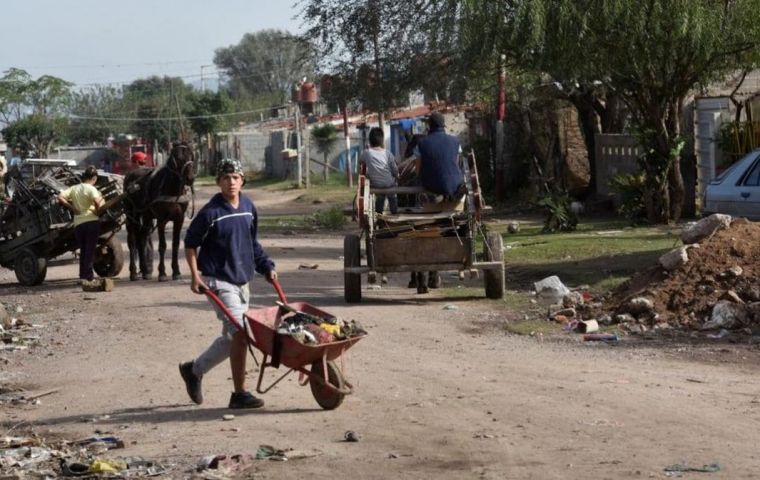MercoPress. South Atlantic News Agency
Argentina shows marginal decrease in people below poverty lines
 “Inflation has a corrosive effect, especially on lower wages,” the UCA said
“Inflation has a corrosive effect, especially on lower wages,” the UCA said Argentina's Catholic University (UCA) has released a study showing there were over 18.4 million poor people in the country, which would account for 43.8% of the population.
However, it meant a decrease compared to the closing numbers of 2020, although it did show some signs of consolidation across the highest levels of poverty and indigence which have been on the rise in the past decade.
The UCA's data showed 43.8% of Argentines do not meet their needs even when the pandemic seems to be almost over and the economy is bouncing back, albeit in a more precarious way.
The UCA's Observatory of Social Debt said the decrease in poverty against 2020 was purely marginal.
At the same time, indigence showed a more significant reduction this year due to food assistance policies, with only 8.8% of the population behind those lines, against 9.8% the previous year, even though funding was below that of 2020.
The Observatory also explained current data was very similar to that of pre-pandemic times, although the number of children up to the age of 17 living in poor households went up to 64.9% in October 2021 against 64.6% a year before, while homelessness affected 14.7% of those under 17 years of age, one point below last year's measurement but still above pre-pandemic levels.
Despite the economic recovery, employment is increasingly precarious, the UCA study showed as it signalled a strong correlation between poverty, low income and the type of employment created in Argentina, with 30% of the population over 18 years of age having regular but precarious jobs up to October, while 19.2% carried out temporary jobs or had signed up for assistance programs.
In other words, only 42.1% of the economically active population “managed to access full employment with rights” (registered workers with access to health and social security).
In its report titled “Employment crisis, income poverty and structural deficiencies in Argentina 2010-2021”, the UCA's Observatory mentions “the persistence of a precarious labour market that excludes part of the workers from a job in quality beyond COVID.”
”Inflation has a corrosive effect, especially on lower wages,” the UCA said. Between 2019 and 2021 the purchasing power of wages fell 7.4% overall.




Top Comments
Disclaimer & comment rulesCommenting for this story is now closed.
If you have a Facebook account, become a fan and comment on our Facebook Page!